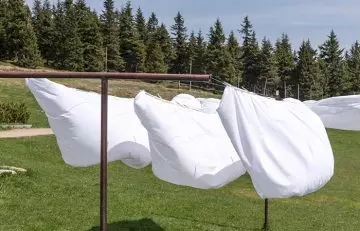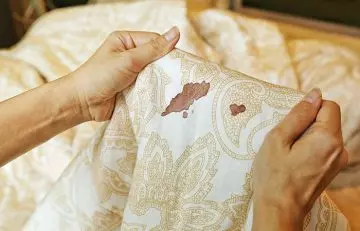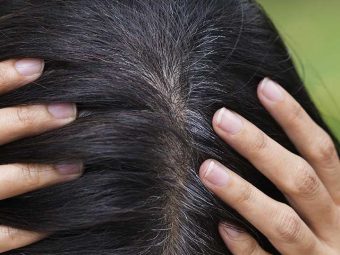Your Sheets Are Filthy! Here’s Why (And How To) Change Them

Image: Shutterstock
How often do you change your bed sheets? Once a week? Once every two weeks? Once a month? Once in two months?! Well, if your answer is leaning towards the latter, you’re in big trouble! Cleaning expert and New York Times bestselling author of My Boyfriend Barfed in My Handbag… and Other Things You Can’t Ask Martha, Jolie Kerr is here to tell why and how you should ideally wash your sheets once every week (1).
Why Should You Wash Your Sheets Regularly?
Well, the number-one reason is that they are filthy. Period. Kerr explains that when in use, your bed sheets pick up a lot of dirt and grime. They are subjected to your sweat, dead skin cells, drool, sexual fluids, and your body’s natural oils, which it secretes all the time. These can make your sheets really smelly.
Moreover, if you’re in the habit of snacking on your bed, you can expect your sheets to be full of food crumbs, even if you dust them off. These crumbs instantly attract ants and other critters, forcing you to share your bed with them even if you don’t want to!
As if that wasn’t enough to make you feel that your bed is the dirtiest, grossest space on planet earth, dust mites are also pretty much a part of your bedspread! Dust mites feed on the dead skin cells you shed and which accumulate on your sheets. So, if you’ve got any kind of allergies, you can expect them to worsen due to the presence of these mites (2).
Finally, if you have sensitive skin that is prone to breakouts, your bed sheet can make your breakouts worse. Sheets that have a lot of oily buildup will aggravate your acne further (3). Granted, you can change your pillowcases to mitigate this situation, but it won’t help if you have body acne too, says Kerr.
Still looking for another reason to wash your sheets? Once you slip in the middle of fresh, light sheets, you’ll feel like you’re floating on cotton clouds on a dreamy night! Besides, your bed is a holy space where you sleep and make love – two of the most important pleasures of life, so you might want to treat this space with respect.
How Frequently Should You Wash Your Sheets? And What Method Should You Follow?
Irrespective of the wash and care guidelines that have been a part of your family for generations, the wash cycles of your bed sheets should take your personal considerations into account. For example, if you have a laundry nearby or not (since some sheets can be really heavy), or if you shower before bed, or share your bed with a partner, or don’t have more than a pair of sheets and so and so forth.
That said, even when you take your lifestyle into account, certain bed sheet washing timelines are considered better than the others:
- Ideal: once every week
- Good: once in two weeks
- Acceptable: once in a month
- Problematic: once in 6 weeks
- Completely unacceptable and widely discouraged: once in two months
Now that we’ve cleared that up, let’s talk about the best wash practices that Kerr recommends:
1. Pillowcases And Bed Sheets
You can wash your sheets and pillowcases in warm or hot water. Apart from adding detergent to the water, you should also mix in a strong stain remover as it will help clean all the oil, sweat, and drool buildup on your sheets. Before you spread these sheets back on your bed, you should dry them thoroughly either in the dryer or on the clothesline. If sheets are colored, dry them in shade.
2. Other Kinds Of Bedding
Stuff like your blankets, comforters, and pillows should be washed as well, although you can get away with washing them much less frequently. The point is, your other bedding contains the same dust, grime, and germs as your sheets, so washing them is a must too. Follow the wash and care instructions given on individual bedding items and make sure you clean them twice a year, adds Kerr.
3. Stain Removal
Your bedspreads can suffer from a variety of stains. Here are Kerr’s tips on removing different types of stains:
- Sweat: To wash off yellow sweat stains, you should use a strong, commercially available stain removal agent.
- Urine or feces: If you have a child or a pet in the house, such stains are highly likely. Borax can help remove these stains quite effectively.
- Sexual fluids: No matter how hard you try, some of it will always be left behind. An enzymatic stain remover can help clean out these stains, regardless of whether they ‘came’ from a woman or a man.
- Blood: Don’t get alarmed! Blood stains can be the result of a wound you scratched, a nosebleed or even periods. Blood stains are generally hard to treat, but fortunately, you have many options to get rid of them, such as hydrogen peroxide, saline solution, enzymatic cleaners, salt, etc.
Your home is a heavenly abode and your bedroom, more precisely your bed, is the sanctum sanctorum of it. So, treat it with care and always keep it clean for your own good health.



























